Some Palestinians say coronavirus being purposely spread through returning laborers, a charge Israelis vigorously deny
The Palestinian Authority is blaming Israel for the rise in West Bank COVID-19 cases, raising the ire of the Israeli government, which has warned of dire consequences should the accusations continue.
The PA’s Ministry of Health says the most recent cases of coronavirus can be linked to returning laborers, with some having entered via unmonitored routes – a charge that some figures in the West Bank say indicates an orchestrated attempt by Israel to further spread the pandemic.
Last week, after 15 laborers – all employed at the Israeli-run Atarot industrial zone between Ramallah and Jerusalem – were diagnosed with COVID-19, PA Prime Minister Mohammad Shtayyeh accused Israel of placing its economy over people’s health.
“The real gap in the Palestinian battle against the spread of coronavirus is the [Israeli] occupation,” Shtayyeh said. “Its settlements, its barriers and all its measures try to thwart our efforts to protect our people. … The economy of Israel is not more precious than the lives of our children.”
Several days ago, a senior Israeli defense official told Israeli media that the PA accusations were “a racist incitement campaign against the IDF and Israel.”
According to reports on Israel’s Channel 12, the government sent “very strong messages” to senior PA officials, including Shtayyeh, warning that if such accusations continued, Israel would “take action” concerning security cooperation and freedom of movement by PA security officials.
The West Bank city of Tulkarem is adjacent to the Israeli city of Netanya to the west, and the Palestinian cities of Nablus and Jenin to the east, making it a major crossing point for workers.
Issam Abu Baker, head of the Tulkarem Governorate, told The Media Line that about five years ago, laborers began crossing illegally via holes in the border fence and drainage channels beneath the West Bank barrier that Palestinians call a racial segregation or apartheid wall and that Israelis refer to as a security barrier against terrorism.
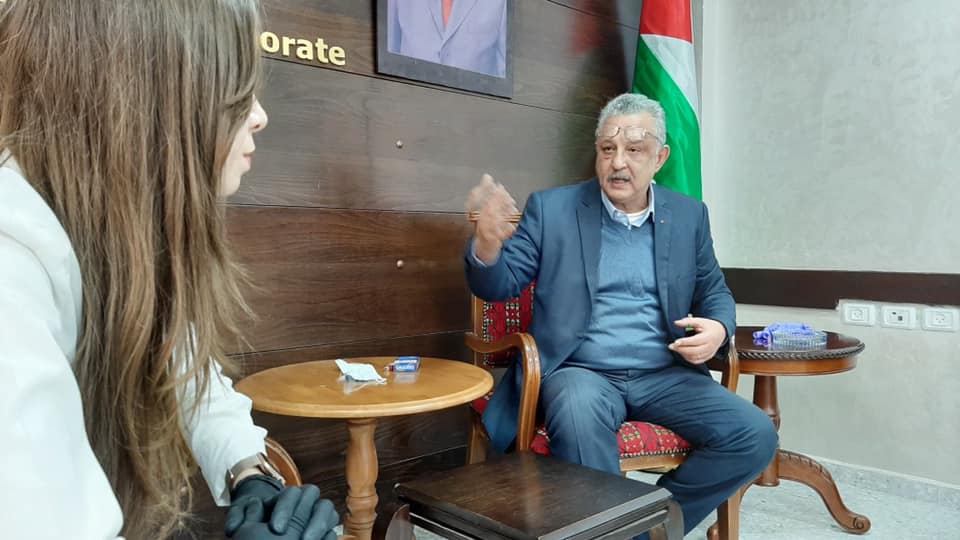
Tulkarem Governor Issam Abu Baker speaks with The Media Line, Tulkarem, West Bank, April 13, 2020. (The Media Line)
“We have been against this practice since the very beginning,” he said. “Prior to the spread of coronavirus, illegal crossings were a matter of security and the exploitation of workers. But now the issue has become linked to the fate and health of our people. It has become completely unacceptable to the Palestinian leadership.”Abu Baker says the official policy has been embarrassing, as it requires cooperation with Israel regarding barriers that the Palestinian leadership has long rejected.
“We condemn the racist separation wall, of course, but when we contact the [Israeli] Civil Administration, Israel responds by blaming a private company that manages crossing points. It just throws responsibility on other parties,” he complained.
“I believe there are gangs of Palestinians who cooperate with Israel to smuggle workers,” he said.
“It’s not security collaboration but more of a business deal,” he explained. “They charge each worker 100 to 200 shekels for safe passage into Israel and back to the West Bank. Some other times we have found gates [along the border that are normally closed and locked] wide open, as if the army wants this to happen, whether for reasons related to increasing workforce needs or to create an unstable situation in the West Bank amid the global pandemic.”
The IDF Spokesperson’s Unit told The Media Line that it operates in a variety of overt and covert ways along the border in order to prevent illegal crossings and that in light of the pandemic, it has increased its operations along the border. Responding to the accusations, the unit said, “Any claim of the IDF participating in actions in order to spread the coronavirus is ridiculous and incorrect.”
Col. (res.) Grisha Yakubovich, a former head of the Civilian Department in the Israeli Defense Forces unit for Coordination of Government Activities in the Territories (COGAT), spoke to The Media Line in his personal capacity as an expert on Israeli-Palestinian relations. Yakubovich condemned the PA’s accusation that Israel was responsible for introducing the virus into the Palestinian territories, given that, since the beginning of the COVID-19 outbreak in the region, there was full coordination between the Palestinians and Israelis on health issues, particularly between the IDF and the Palestinian Ministry of Health.
“The coordination is at all levels: in the field and at the level of ministries and the civil administration,” he said.
An illegal worker from a village near in a northern governorate, who spoke to The Media Line under condition of anonymity for security reasons, said that the Israeli security forces had eased up on workers after the coronavirus crisis: “I work in the Tel Aviv area and around it in farming and I enter Israel using the holes in the fence.”
He explained that in the past, workers would pay 100 to 200 shekels for safe passage into Israel, but now they pay “from 25 to 50 shekels – depends on the mood of the broker.” The worker explained that the price dropped after the crisis as smuggling holes had greatly increased.
“There are between 20 and 30 holes in the fence near Zeita village. I have to pay for the brokers to pass. They are like a mafia; one time they tried to shoot at me,” he said. “Nowadays, the entry is much easier after the crisis and there are facilitations; the army allows us to pass without stopping us like before, as if they don’t see us or they try not to.”
He added, “Even inside Israel, nobody stops me or checks my ID, unlike before.”
The Media Line visited the West Bank barrier and confirmed that in certain areas, it is ridden with holes and unguarded by soldiers.
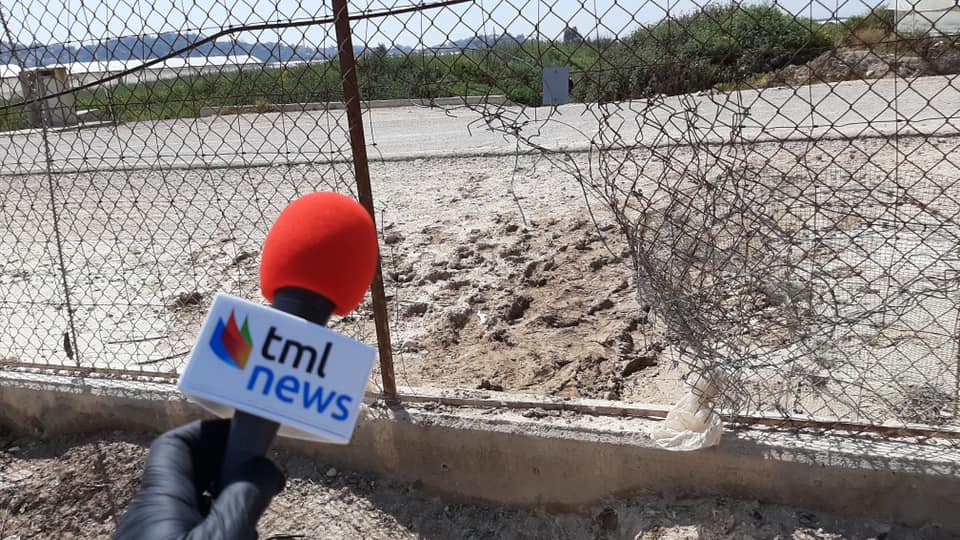
A hole in the fence near Tulkarem, West Bank, April 13, 2020. (The Media Line)
Yakubovich pointed out that in the area of Zeita, north of Tulkarem, where there are many holes in the West Bank barrier, workers use these to enter Israel illegally to work in the area of Harish because decent-paying jobs are scarce on the Palestinian side of the barrier.
Around 140,000 to 150,000 Palestinians work in Israel, Yakubovich said, of whom about 40,000 to 60,000 enter illegally. In total, these workers bring around 5.5 billion shekels ($1.5 billion) to the Palestinian economy annually. In addition, Palestinians who work in Israeli settlements earn around 1.1 billion to 1.2 billion shekels ($310 million to $330 million) per year.
“Of course it [the issue of illegal workers] is very bad, as the [israeli] employer isn’t obligated in that case to pay the worker benefits, but the reality on the ground is that people prefer to take the risk and work in Israel in order bring food back home [to their families].” he said.
Yakubovich added that, through his connections in the IDF, he knew that regarding illegal workers, the Tulkarem Governorate was in coordination with the Israeli District Coordination and Liaison (DCL) unit in the area. “I have no explanation why the PA and the Tulkarem Governorate are blaming Israel for lack of coordination, when there’s aid entering [from Israel] to Tulkarem, and also to [the rest of] the West Bank, and Palestinian doctors are being trained by Israeli doctors and assisted with courses and equipment.”
This holiday season, give to:
Truth and understanding
The Media Line's intrepid correspondents are in Israel, Gaza, Lebanon, Syria and Pakistan providing first-person reporting.
They all said they cover it.
We see it.
We report with just one agenda: the truth.


According to Yakubovich, in the end, officials will say what they must, but the security and health coordination between the two sides will continue because it is important for both sides.
Abu Baker said the Palestinian leadership had formed ad hoc “emergency popular committees” to monitor the border areas, primarily to control the illegal entry of returning workers and to escort them to quarantine sites or hospitals as needed.
“We understand that our workers need to go [to Israel], as there are no job opportunities here because of our weak economy under the occupation,” he said. “But their entry should be through legal channels.”
Moshe Marzouk, a research fellow at the International Institute for Counter-Terrorism in Herzliya, told The Media Line that Palestinian workers in Israel are paid 10 times more than what they would make in the West Bank.
“In one day, a construction worker can make between 400 and 500 shekels,” he said. “Since the beginning of the COVID-19 crisis, most Israelis have remained at home, which increased job opportunities for [Palestinian] workers, especially in the service sector.”
Marzouk notes that the PA had approved the offer for laborers with permits to remain in Israel.
“But not all [Palestinian] workers in Israel are legal,” he continued. “We know that there is a financial crisis and we try to help them. Now isn’t the time to check the legality of workers, even if they break some rules. … There is no work in the West Bank.”
He criticized the PA for using the issue to make false accusations against Israel, especially at such a time.
“They can fight us later,” he said. “Most of the holes they talk about existed prior to the coronavirus crisis. Hundreds of workers have used them throughout the years, and the Israelis didn’t arrest them for humanitarian reasons. The area isn’t dangerous, and some of these workers can’t pay to get a work permit in Israel or can’t find an Israeli employer to sponsor them.”
According to Marzouk, it is the Palestinians who are using the pandemic for their own needs.
“The accusations are an attempt to sabotage Israel’s image,” he stated. “Even if we legalize all [Palestinian] workers, some will still use these illegal channels [for crossing the border].”
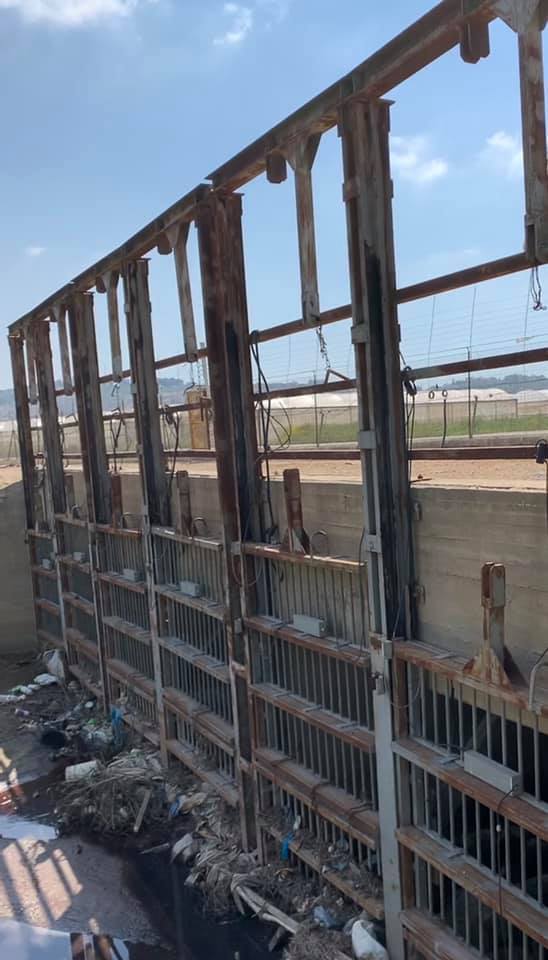
Sluice gate along the separation barrier near Tulkarem, West Bank, April 13, 2020. (The Media Line)
Lior Akerman, a retired senior member of the Shin Bet, Israel’s internal security service, and today a political analyst, scoffed at the allegations against Israel.
“I never heard of such a thing,” he told The Media Line. “The idea itself sounds hallucinatory, much like many conspiracy theories being circulated these days.”
Akerman said Israel had invested a lot to remedy the coronavirus crisis and had shipped tens of thousands of test kits to the PA.
“There is no logic to [their accusations] since any serious health event that occurs in the Palestinian Authority will immediately affect the citizens of the State of Israel,” he said. “More than 400,000 Israelis live in the West Bank. Tens of thousands of Palestinians work in Israel. How can such a thing work [to Israel’s advantage]?”
Akerman admits that some Israeli employers need Palestinian workers enough to exploit breaches in the fence to move them illegally.
“But even if these things happen,” he said,” they are very few [in number].”
Abd Alrahman Sabah, a fieldwork coordinator for one of the ad hoc committees the Tulkarem Governorate’s Abu Baker mentioned, told The Media Line that Israeli soldiers in the area now appear to have a lax attitude toward cross-border movements, allowing dozens of laborers to cross freely.
“If we try to approach the worker to take information about his movements in Israel, to evaluate his health and whether he needs to be quarantined or escorted to a hospital, Israeli soldiers stop us,” he said.
Sabah charges that some Israeli employers take advantage of Palestinian workers, hiring them when they are in good health and, after they get sick, leaving them at checkpoints. There was one documented case in which a worker had symptoms of coronavirus after being left at a checkpoint, although he turned up negative when tested in the Palestinian territories.
“The Israeli facilitation of workers’ entries at such a time can only be understood as if Israel is helping to transmit the virus to Palestine, an emerging country that doesn’t have capabilities to face such a pandemic,” he added.
Khalid Tamimi, a member of the Nabi Salah committee in the Ramallah Governorate, told The Media Line that Israeli employers often drop their workers off in West Bank streets.
“We have lists of all the legal and illegal workers from the area, and we … search for them when they return – respectfully – to take needed measures after informing the authorities,” he said.
“We understand that these workers need their jobs and the money to live, but their entry into Israel and then their return must be coordinated within precautionary measures,” he added.
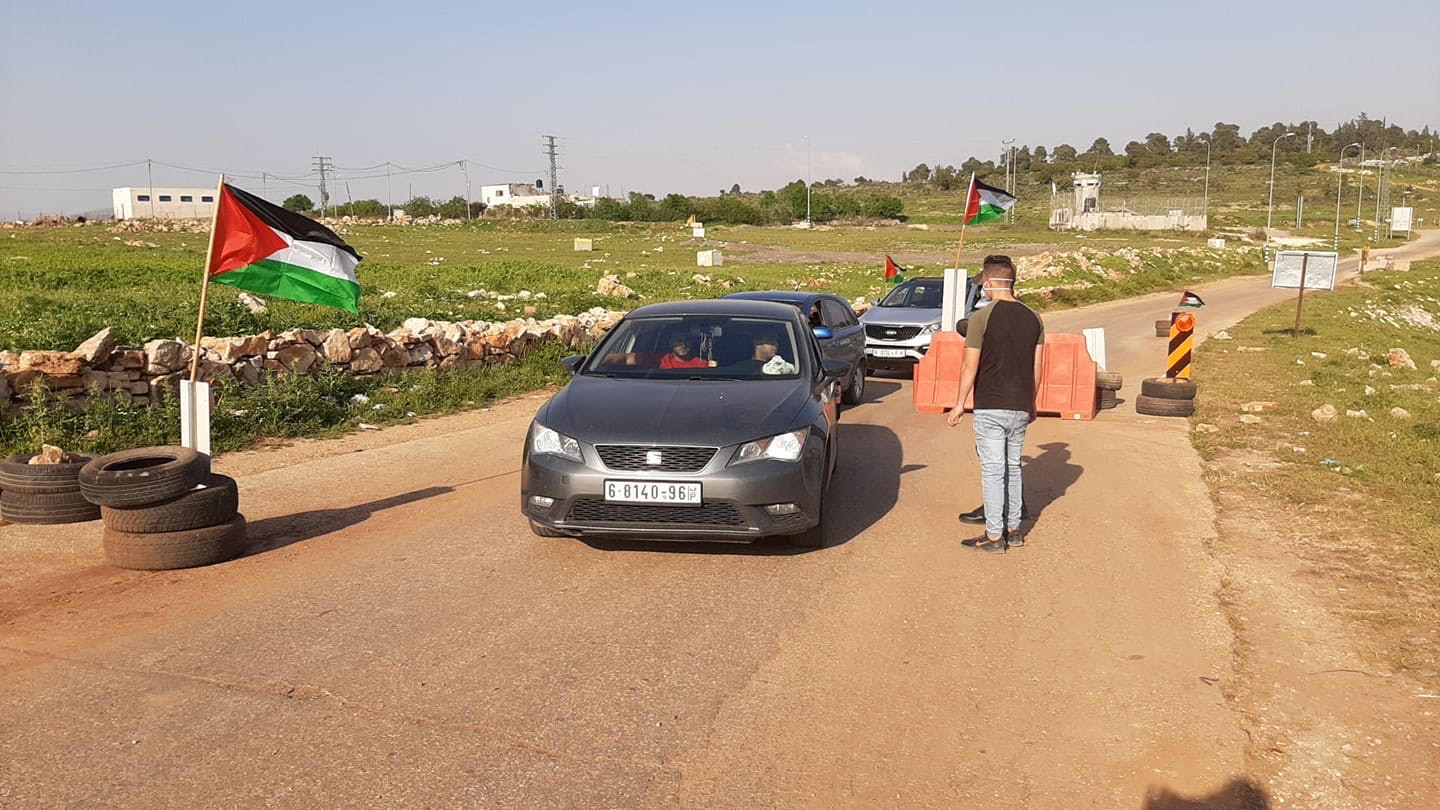
A Palestinian checkpoint at the entrance to Nabi Saleh, April 14, 2020. (The Media Line)
Tamimi revealed to The Media Line that committee members spread out widely during both day and night, including in the hills.
“We managed to find four workers,” he related. “Two of them came from Jerusalem. We made sure they knew we were not targeting them personally, rather that we wanted to help them, so we called in medical staff to conduct needed measures.”
Yakubovich pointed out that the illegal movement wasn’t something new and that all parties were aware of it, but the PA never accepted the security fence. It never agreed to coordinate with Israel to stop Palestinian workers from crossing the fence illegally because it considered the fence illegal. “Now, suddenly, in the days of coronavirus, the PA wants to coordinate with Israel on that issue and the fence that it declared illegal,” Yakubovich said.
Tareef Ashour, spokesperson for the Palestinian Health Ministry, told The Media Line that 75% of the West Bank’s COVID-19 cases came from people employed in Israel.
“The rest is from tourism, particularly in Bethlehem and East Jerusalem,” he stated, “as well as arrivals from abroad … through the Al Karameh [Allenby] Bridge or Lod [Ben-Gurion] Airport.”
Ashour said the PA had already solved the matter of infections coming from international arrivals, adding that the matter of Palestinian workers in Israel remains a problem.
“Statistics show that we have between 133,000 and 200,000 workers in Israel,” he said. “Some of them have permits, are known to authorities and can be tracked. Those without permits cross … through secret channels and holes in the separation wall, and cannot easily be tracked.”
To handle those with permits, the ministry has erected tents at major crossing points. The staff members provide returning workers with a survey regarding their movements in Israel, as well as their place of employment and related information, to determine which of them should be tested, and which should be escorted places of quarantine.
The ad hoc committees, he continued, handle those working in Israel without permits, intercepting them on their way home and taking them for testing.
A third group works in Israeli settlements within the West Bank itself. Ashour describes these workers as “the most dangerous” pandemic-wise, as they often drive to their job and thus cannot be easily tracked.
“The epidemiological situation in Israel is more dangerous than the situation in Palestine,” he said, “but most of the illegal settlements in the West Bank became foci of transmission. We have testimony from workers saying they were forced to clean places of quarantine there.”
Issam, a Palestinian construction worker from the Nablus Governorate who asked that his last name not be used, has for years been legally employed in Holon, just south of Tel Aviv.
“The [financial] situation here in Palestine is very difficult. I feel suffocated and have debts; therefore I work,” he told The Media Line at a testing station that the PA Health Ministry had prepared in the city of Nablus for laborers returning from Israel.
Issam said that prior to the pandemic, he went home each night, as stipulated in his entry permit. But once the outbreak began, he took advantage of an Israeli offer for legal Palestinian laborers to remain within Israel for a month at a time.
“I stayed for 20 days, and then I decided to go home because I was scared,” he said. “My employer provided excellent food as well as a comfortable place to sleep but the situation there became scary. There were a lot of infections and the precautionary measures were only so-so.”
He was told about the PA’s Nablus testing station.
“I came here and they tested me,” he noted. “Following that, the Palestinian Intelligence Agency and the ministry had me sign a pledge to remain quarantined at home for two weeks.”
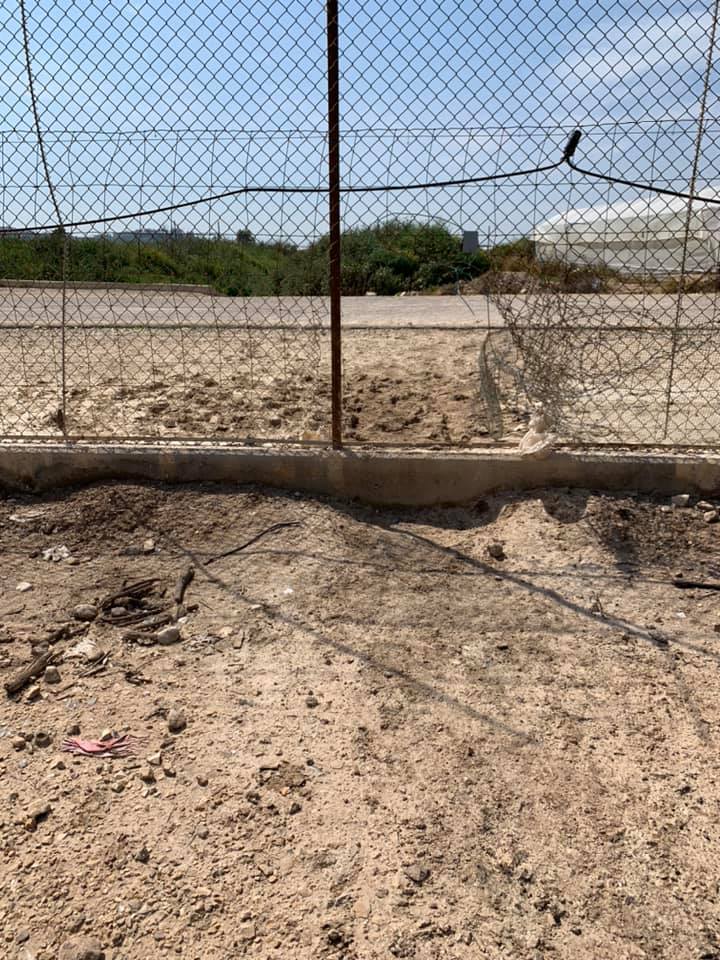
A hole in the fence near Tulkarem, West Bank, April 13, 2020. (The Media Line)
Marouf Adel, a Palestinian construction worker from Beitunia, near Ramallah, is also employed in Israel.
“The contractor I was working with used to give us extra money because he knew we had kids. He gave us the option to stay and sleep, or go back to our cities and villages. I decided to return,” he told The Media Line.
After his return, he could not find work.
“I used to work on a daily basis in Israel, and I used to make money. Now I don’t have any income and I started thinking that maybe I should go back to work [in Israel] at any price,” he said.
A father needs employment, no matter what, Adel says, even during a pandemic.
“I need to feed my family. I don’t want to ask people for money or pity,” he stated. “What do they want us to do? Go steal? How are we supposed to feed our children? The government should help us.”
Felice Friedson contributed to this report.